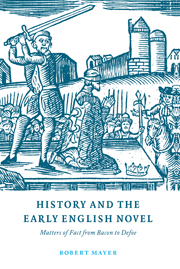Book contents
- Frontmatter
- Contents
- List of illustrations
- Acknowledgments
- Introduction
- 1 Baconian historiography: the contours of historical discourse in seventeenth-century England
- 2 “Idle Trash” or “Reliques of Somthing True”?: the fate of Brut and Arthur and the power of tradition
- 3 The History of Myddle: memory, history, and power
- 4 Lifewriting and historiography, fiction and fact: Baxter, Clarendon, and Hutchinson on the English Civil War
- 5 The secret history of the last Stuart kings
- 6 “Knowing strange things”: historical discourse in the century before Robinson Crusoe
- 7 “History” before Defoe: Nashe, Deloney, Behn, Manley
- 8 Defoe's historical practice: from “The Ages Humble Servant” to Major Alexander Ramkins
- 9 “Facts that are form'd to touch the mind”: Defoe's narratives as forms of historical discourse
- 10 From history to the novel: the reception of Defoe
- Conclusion
- Index
- CAMBRIDGE STUDIES IN EIGHTEENTH-CENTURY ENGLISH LITERATURE AND THOUGHT
2 - “Idle Trash” or “Reliques of Somthing True”?: the fate of Brut and Arthur and the power of tradition
Published online by Cambridge University Press: 31 October 2009
- Frontmatter
- Contents
- List of illustrations
- Acknowledgments
- Introduction
- 1 Baconian historiography: the contours of historical discourse in seventeenth-century England
- 2 “Idle Trash” or “Reliques of Somthing True”?: the fate of Brut and Arthur and the power of tradition
- 3 The History of Myddle: memory, history, and power
- 4 Lifewriting and historiography, fiction and fact: Baxter, Clarendon, and Hutchinson on the English Civil War
- 5 The secret history of the last Stuart kings
- 6 “Knowing strange things”: historical discourse in the century before Robinson Crusoe
- 7 “History” before Defoe: Nashe, Deloney, Behn, Manley
- 8 Defoe's historical practice: from “The Ages Humble Servant” to Major Alexander Ramkins
- 9 “Facts that are form'd to touch the mind”: Defoe's narratives as forms of historical discourse
- 10 From history to the novel: the reception of Defoe
- Conclusion
- Index
- CAMBRIDGE STUDIES IN EIGHTEENTH-CENTURY ENGLISH LITERATURE AND THOUGHT
Summary
In the History of … Princess Elizabeth, Camden indicated that he thought it improper to invent speeches “of mine own Head.” Truth was his “onely Scope and Aim,” and truth meant matters of fact: “The bright Lustre of uncorrupt Faithfulness shining forth in … Monuments and Records.” The historical scholar must not invent, then, but what should the historian do with venerable material that was often dismissed as fabulous but more often included in accounts of the history of England? Such was the “British History,” the collections of stories about ancient kings and visits from apostles of Christ, much of which was derived from Geoffrey of Monmouth's Historia Regum Britanniae or History of the Kings of Britain (c. 1136). Geoffrey's widely read History was an important authority on the Trojan Brut and King Arthur for at least four hundred years, but from the first there were skeptics: Geoffrey's contemporary William of Newburgh denounced the former's account as “Ridicula jigmenta.” Yet the Galfridian stories also had credible defenders like Caradoc of Lancarvan, and important historians defended and used Geoffrey's account of British antiquity for centuries. However, the sixteenth century is generally represented as the moment when faith in Geoffrey was undermined, and while it was Polydore Vergil who began the “debunking” of Brut and Arthur, Camden is usually named as the historian who definitively discredited Geoffrey's account.
Whoever gets the credit, most historians of English historiography have argued that “reputable” scholars “had decided against Geoffrey” by the beginning of the seventeenth century.
- Type
- Chapter
- Information
- History and the Early English NovelMatters of Fact from Bacon to Defoe, pp. 34 - 53Publisher: Cambridge University PressPrint publication year: 1997

